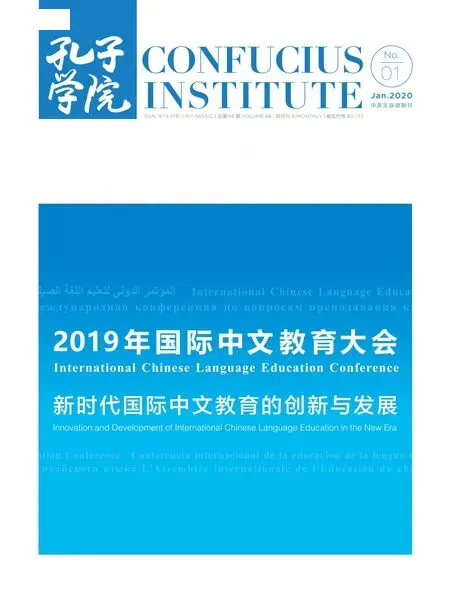古川裕
世界汉语教学学会副会长/日本中国语教育学会原会长

今天我非常荣幸能够代表世界汉语教学学会在开幕式上致词。我是世界汉语教学学会副会长古川裕,现在在日本大阪大学从事汉语教学。趁今天这个难得的机会,请允许我先简单说说我自己的汉语人生。
我是1978 年4 月进入大阪外国语大学汉语专业开始学习汉语的,算起来已经有四十一年的汉语学习经历了。很荣幸这四十多年和中国的改革开放同步一路走来。
1986 年我在东京大学拿到硕士学位以后,有幸拿到中国国家留学基金委的奖学金,能够来到北京大学中文系进修两年。1988 年留学生活结束以后就回母校开始教汉语,至今也有三十年的教龄了,可以说是一个名副其实的老教师了。
我人生已经有一半以上的时间都跟中国、跟汉语有非常密切的交流,估计我这辈子跟汉语有很深的缘份,相信一辈子都分不开。在这四十年的时间内,作为一个旁观者,我一直在观察中国的巨大变化以及由此变化给世界以及给日本带来的各种影响。
众所周知,日本跟中国之间已有千余年,甚至可以说有几千年的交流历史。日本也是除了中国以外,唯一一个还在使用汉字的国家。因此,我们对汉语的教学和研究也有很悠久的历史,这可以说是日本的一个特色。两国人民都对双方的语言有很深的亲切感,喜欢学汉语的日本人以及喜欢学日语的中国朋友,其人数越来越多,其学习热情也越来越高,这是值得我们高兴的事情。
与此同时,我们也要注意,虽然日本学生学习汉语的条件越来越好,但是目前大部分的学习者只能学基础或是初级阶段的汉语,能够学到中高级水平的学生并没有那么多,能用汉语能跟汉语母语者进行交流的人才非常欠缺,需要尽快培养补充汉语人才。
一句话就是,汉语学习者的“数量”问题基本解决了,我们现在面临的问题是汉语学习者“质量”的提高。我个人认为这是目前日本汉语教学界急需解决的一个问题。另外,从宏观的角度看,我们也在面临一个跨国的、世界性的大问题,那就是人工智能的发展给外语教学带来的挑战,汉语国际教学也不例外。
记得前些年英国牛津大学的一位学者发表了一篇论文说,几十年后,随着人工智能日新月异的发展,会有几个职业在这世上不需要存在了,其中就有老师和翻译两个行业,呜呼哀哉!
又比如,机器翻译的发展很快,现在我们手里只要有一个小机器,就完全可以无忧无虑,能跟外国人进行面对面的交流了。虽说如此,我们也不要太悲观,人脑肯定比电脑更聪明,人心一定比机器更会体贴人。机器人除了听说读写外语以外,还不能代替我们人类,更不能发挥个性来创造艺术性的世界。我们都知道“教育”两个字就是“教书育人”的意思,我们的最终目的应该是通过教汉语来“育人”,也就是“培养人才”。
我们可以通过汉语教学,努力培养既有汉语能力又富有人文精神的人才,在不同的国家和不同的文化间搭起汉语的桥梁。
我们一起努力,一起奋斗吧!
Dr. Furukawa Yutaka
Vice President of the International Society for Chinese Language Teaching Former President of the Japan Association of Chinese Language Education
Today, I am greatly honored to deliver an opening speech on behalf of the International Society for Chinese Language Teaching. I am Yutaka Furukawa,Vice President of the International Society for Chinese Language Teaching,and I am now teaching Chinese at Osaka University in Japan. Today, taking this precious opportunity, please allow me to briefly talk about my life with the Chinese language.
I started learning Chinese as a Chinese major student in April 1978 at Osaka University of Foreign Studies.That means, I have been studying Chinese for 41 years. I am very lucky that over the 40 years or so, I have come along with China’s reform and opening up all the way.
In 1986, when I got a master’s degree from Tokyo University, fortunately, I received a scholarship from the China Scholarship Council and was able to study in the Department of Chinese Language and Literature at Peking University for two years. In 1988, I returned to my alma mater and began to teach Chinese after my study in China.Up to now, I have been teaching for 30 years, and I am a veritably experienced teacher.
For more than half of my life, I have had very close communication with China and Chinese. I think I am deeply connected with and inseparable from Chinese throughout my whole life.Over the four decades, as a bystander, I have been observing the great changes in China and its impact on the world and Japan.
As we all know, Japan has a long history of exchanges with China for hundreds of years, even thousands of years. Japan is also the only country that still uses Chinese characters besides China, so we have a long history of teaching and studying Chinese,which can be regarded as a feature of Japan. The two peoples have a deep affinity with the languages of both sides.The number of Japanese who like to learn Chinese and Chinese friends who like to learn Japanese continues unabated and our enthusiasm for learning is also growing increasingly. That is worth to be happy for us.
At the same time, we should also note that although the conditions for Japanese students to learn Chinese are improving, most students today can only learn at a basic or primary level,and not many students can reach to a middle or advanced level. As a result,there are pretty few talents who can communicate with native speakers in Chinese, and the situation urges us to train and supplement such Chinese talents.
In a word, the problem of the“quantity” of Chinese learners has been basically solved. What we are facing is to improve the “quality” of Chinese learners. In my opinion, the problem is urgent to be solved in the current Chinese language education in Japan.Additionally, from a macro perspective,we are also confronted with a transnational and worldwide challenge—the challenge to foreign language teaching brought by the development of artificial intelligence, and the international Chinese language teaching is no exception.
I remember a scholar from Oxford University published a paper a few years ago, saying that with the rapid development of artificial intelligence,some professions are no longer needed in the world in the coming decades,including teachers, translators, and interpreters. Alas!
For example, machine translation is developing so rapidly. With a small machine translator in hand, we can be carefree to communicate with foreigners face to face now. Even so, we should not be pessimistic, because the human brain is definitely more intelligent than the computer and the human heart is certainly more considerate than the machine. Except for listening,speaking, reading and writing in foreign languages, robots cannot replace human beings. If robots communicate on their own, they cannot give full play to their personalities to create an artistic world. We know that the word “education” means “imparting knowledge and cultivating people”, and our ultimate goal should be to “cultivate people” by teaching Chinese, that is, to “foster talents”.
In that case, we can make great efforts to cultivate talents with Chinese language proficiency and full of human touch through Chinese teaching, and build bridges of Chinese among different countries and different cultures.
Let’s work together shoulder to shoulder!

